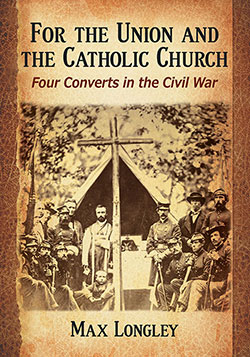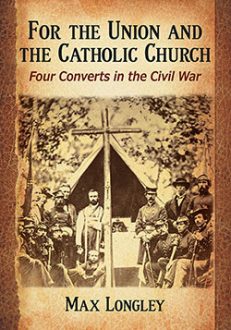For the Union and the Catholic Church
Four Converts in the Civil War
Original price was: $39.95.$31.99Current price is: $31.99.
In stock
About the Book
Four men joined the Catholic Church in the mid–1840s: a soldier, his bishop brother, a priest born a slave and an editor. For the next two decades they were in the thick of the battles of the era—Catholicism versus Know-Nothingism, slavery versus abolition, North versus South. Much has been written about the Catholic Church and about the Civil War. This book is the first in more than half a century to focus exclusively on the intersection of these two topics.
About the Author(s)
Bibliographic Details
Max Longley
Format: softcover (7 x 10)
Pages: 312
Bibliographic Info: 44 photos, notes, bibliography, index
Copyright Date: 2015
pISBN: 978-0-7864-9422-4
eISBN: 978-1-4766-1999-6
Imprint: McFarland
Table of Contents
Table of Contents
Preface 1
1. “Every man, Catholic and non–Catholic, fell on his knees with his head bowed down” 5
2. The End of Religious Controversy 19
3. “I have the responsibilities, he the virtues” 28
4. “An heir-loom” 49
5. “The radical necessity of the Church” 65
6. “The Catholics … will be found among the fastest friends of the Union” 80
7. “The devil … comes to us as a philanthropist” 85
8. “Cowards fearing the light of day, and skulking beneath the cover of darkness” 101
9. “The Know-Nothings have inaugurated a new era” 113
10. “Framed, no doubt, for the express purpose of corrupting the faith of Catholic children” 121
11. “I wish that secession had never been thought of” 137
12. “Called upon by both sides to fight in the battles of the country” 145
13. “The nations of antiquity had slaves; where are those nations now?” 155
14. “Unless, as a body, we besiege Heaven with prayer, God will not be pacified” 168
15. “Waning of the prejudice against our religion, coming from the highest range of Protestant society” 184
16. “The most logical and effective assailants of slavery that these last three years have produced have been devout Catholics” 196
17. “If the general is crossing himself we are in a desperate situation” 201
18. “A mere inferential recognition, unconnected with political action or the regular establishment of diplomatic relations” 210
19. “Judea produced but one Judas Iscariot” 220
20. “The Bishop attributes to God what is an execrable violence of men” 231
21. “The only country in which the Pope could seek and find a suitable and secure Asylum” 243
Conclusion 253
Chapter Notes 255
Bibliography 282
Index 295
Book Reviews & Awards
“in-depth coverage of Catholic responses to nativism, slavery and the war superbly situates the church within the central storyline of American history. Longley’s research is impressive, incorporating…long-overdue study”—Civil War News; “riveting account…an inspiring account of American Catholicism and the men who went about building it from the ground up”—New Oxford Review; “Max Longley’s fine book details the experiences of four prominent Catholic converts in the Civil War…Union Major General William S. Rosecrans, his bishop brother Sylvester, the editor Orestes Brownson, and a black priest, James Healy. But the book offers far more than that. It is also a definitive study of the Catholic religion in the Civil War era…a worthy and unique addition to the Civil War canon.”—John C. Waugh, The Class of 1846—From West Point to Appomattox: Stonewall Jackson, George McClellan and Their Brothers; “Longley’s study of these four male converts…utilizes the best recent scholarly research written on Catholics during this period in combination with his own original research…other historians will appreciate his thorough and very helpful exploration of the background and motivations of his four subjects.”—William B. Kurtz, Excommunicated from the Union: How the Civil War Created a Separate Catholic America; “For all the ink spilled on the Civil War, there are still frontiers to conquer, and Max Longley is an adept pioneer. The mixture of religion and the Civil War is not a new theme, but For the Union and the Catholic Church provides a stunning view of the various roles of Catholicism among those who fought in the war in particular and in northern society in general. Through the lives of four individuals, Longley creates an impressive story of how both the Church and the religion connected with the Union cause. The book is thoroughly researched and engagingly written. It is a welcome addition to Civil War scholarship.”—David Goldfield, University of North Carolina, Charlotte, author of America Aflame: How the Civil War Created a Nation.





